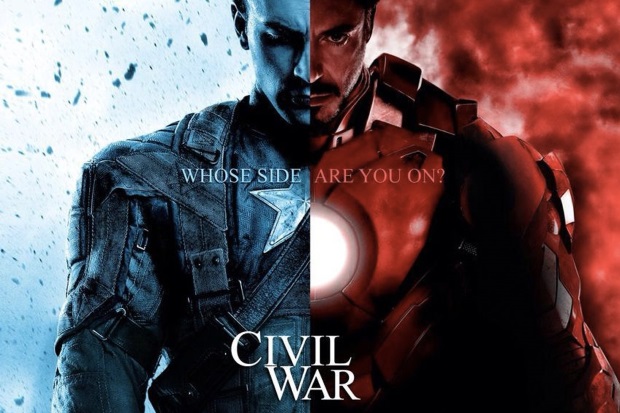There was so much that could have gone wrong.
“Captain America: Civil War,” the latest film in Marvel’s interconnected movie universe, is a political thriller involving nearly all of its established characters, and introduces new ones on top of it. Giving all these personalities their due without crowding out Cap as the central character is difficult. Making them all interact in a plot that doesn’t disintegrate into a jumbled mess is a herculean task.
The fact that the actual movie does all this and makes it look effortless is a near miracle.
When an Avengers’ mission in Nigeria goes awry and innocents die, it’s the last straw in a long line of fights with lots of collateral damage, as seen in earlier movies. The United Nations move to create a board that would dictate where and when the heroes can act. Some, such as Tony Stark, AKA Iron Man (Robert Downey Jr.), see this as a necessary step forward, while others, most notably Steve Rogers, Captain America (Chris Evans), chafe at the idea of government oversight.
But when Roger’s old friend Bucky Barnes, AKA the Winter Solider (Sebastian Stan), is implicated in a terrorist attack, Captain America goes AWOL to save his wartime buddy, even as it puts him in direct confrontation with his friends and comrades.
This is perhaps the best example of how a shared universe can build on itself. The impetus for the entire film is based on what has happened in previous ones, and the characters’ motivations are believable because of their experiences. Stark’s viewpoint is due in part to his guilt in creating a monster in “Age of Ultron,” while Rogers is afraid people with agendas might try to manipulate the heroes for their own ends, just like in “The Winter Solider.”
Every scene involves characters we’ve grown to know and care about over several movies clashing over their ideals, using both their fists and their words. The fact that both sides have valid points gives impact and dramatic tension to each and every fight, as you’re not sure who you want to root for.
Two of the most notable fights are the airport battle that involves nearly every hero introduced into the Marvel Cinematic Universe so far, and the final fight at the end of the movie. The first is a huge extravaganza as heroes on both sides use their special powers both against and with each other in a struggle that will make every comic fan squeal in pleasure. There’s also light-heartedness to the fight because no one is trying to seriously hurt each other. The last battle is a much smaller affair between only a few people, but due to the emotional stakes ends up being far more memorable and intense.
Part of the reason the film works so well is because all characters are on point. While Downey and Evans are great as ever in roles they have by this point become the definitive version of, the new characters are the real treat. Tom Holland, the latest actor to play Spider-Man, does a great job as a high school kid with great power who cracks one-liners and gushes over the other, more established heroes. But Chadwick Boseman as the Black Panther is the biggest surprise, playing the lesser-known African King-turned-hero so well many have started anticipating his upcoming solo movie. Daniel Bruhl also has a great performance as Zemo, a villain with his own mysterious agenda that may be the worst foe the Avengers have ever faced, despite having no costume or powers.
This movie is already the latest in a long string of hits for Marvel in a streak that shows no signs of slowing. With perhaps the best superhero action put to film since the first “Avengers” movie and more personal stakes, “Captain America: Civil War” expertly juggles its massive cast to give one of the most entertaining films of the year.



